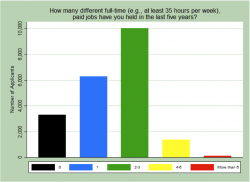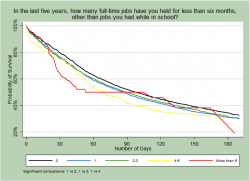Employers of hourly labor in industries including fast-food dining, retail, and contact centers often struggle with high turnover, and the associated costs of constantly hiring and training new employees. A common screening technique used by recruiters is to weed out “job hoppers” — those candidates who have held many short-term jobs. But a recent study by Evolv’s analytics team found that work history is a poor predictor of future job tenure.
 The study analyzed applicant data and employment outcomes from more than 21,000 call center agents drawn from five major contact centers to determine the relationship between previous work experience and future employment outcomes. The results show zero correlation between the number of positions employees have had in the recent past and how long they’ll last on their next job. A candidate who’s had five jobs in five years is no more likely to quit than someone who’s had one job for five years. In addition, the study reports people who are unemployed when they apply for a job also have the same expected tenure as any other candidate.
The study analyzed applicant data and employment outcomes from more than 21,000 call center agents drawn from five major contact centers to determine the relationship between previous work experience and future employment outcomes. The results show zero correlation between the number of positions employees have had in the recent past and how long they’ll last on their next job. A candidate who’s had five jobs in five years is no more likely to quit than someone who’s had one job for five years. In addition, the study reports people who are unemployed when they apply for a job also have the same expected tenure as any other candidate.
Job-hoppers and the “Perpetually Unemployed”
 The study looked at the number of different full-time jobs workers have had in the last five years, and how many full-time jobs they’ve held for less than six months. The results revealed virtually no difference in employment outcomes based on how many jobs a person had, or how many short-term jobs they had previously.
The study looked at the number of different full-time jobs workers have had in the last five years, and how many full-time jobs they’ve held for less than six months. The results revealed virtually no difference in employment outcomes based on how many jobs a person had, or how many short-term jobs they had previously.
In looking at how many jobs employees held in the last five years, the survival curves representing each of the response options (0, 1, 2-3, 4-6, 6+) are virtually indistinguishable from each other. Interestingly, there was virtually no difference between the “perpetually unemployed” — applicants who had no jobs in the last five years — and applicants who had many jobs in that timeframe.
 The curves are slightly more differentiated when looking at the number of jobs employees have held for fewer than six months, with those applicants who had only held jobs for six months or longer remaining on the job 11 more days than others. This result, however, was weaker when Evolv controlled for site and client-specific effects.
The curves are slightly more differentiated when looking at the number of jobs employees have held for fewer than six months, with those applicants who had only held jobs for six months or longer remaining on the job 11 more days than others. This result, however, was weaker when Evolv controlled for site and client-specific effects.
These results indicate that one of the most common screening tactics for employers may actually have no value in predicting future employment success. Despite this, recruiters frequently assess an applicant’s employment history as an indicator of how likely a candidate is to remain with the company. In fact, the data from this study indicated that between 2-6% of applicants were rejected because of their experience and work history, amounting to several thousand candidates excluded from the potential hiring pool.